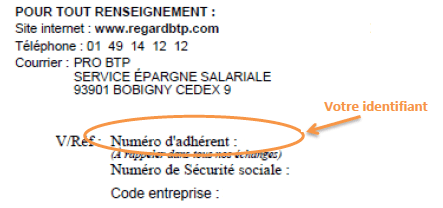Glossary
AFG (Association Française de la Gestion financière) : French Assest Management Association. The AFG is the professionnal body representign te asset management industry. AFG's members are French asset managers : either boutique entrepreneurial houses or subsidiaries of banking, insurance or money management groups.
AMF (Autorité des Marchés Financiers) : The AMF regulates participants and products in France's financial markets. It regulates, authorises, monitors, and, when necessary condcts investigations and issues sanctions. In addition, it ensures that investors receive material information, and provides a mediation service to assist them in disputes.
Asset Management Company : An investment firm that primarily manages individual or collective portfolios on behalf of third parties. She is responsible for the administrative, accounting and financial management of the employee savings fund(s).
Availability of savings : Provision of your employee savings after the due date. Sums saved under a PEE/PEI/PEG become available within 5 years. The amounts saved under a PERCO/PERCOI/PERCOG become available on the day of retirement of the beneficiary. Cases of early release are also provided by the legislator.
Beneficiaries : Employes, former employees, retirees and pre-retirees if the Entreprise, company manager and/or corporate officers and their spouses under the conditions set out in Book III of Part 3 of the Labor Code.
Capital gain : Gain resulting from the difference between the price at wich a security is sold (less exit fees) and the purchase or subscription price (plus entry fees).
Capital loss : Loss resulting grom the difference between the price at wich a security is sold and the purchase or subscription price.
Credit Risk : Degradation of the signature quality of an issuer on which the FCPE is exposed and thus likely to reduce the value of FCPE investments.
Custody fee : Fee charged by a financial intermediary for keeping a securities account.
Date of event : Date taken into account for the treatment of the releases, for the determination of the unlockable sums.
Deadline : The date until which the savings are blocked. After this date, the saving become available and be withdrawn at any time by simple written request or via your private secure account.
Deadline for return : Deadline for receiving your choice of option. After this date, your choice will no longer be taken into account.
Deregistration : A regulatory scheme for the placement of employee assets that applies when the TCCP no longer has contact with unitholders, particularly when the bearer's address is incorrect. This device applies until the end of the thirty-year prescription of assests.
Early release / Early redemption : Provision of your employee savings before the due dates for certain reasons. The employee savings assets are normally blocked for five years (PEE or PEI). However, the law provides for reimbursement cases allowing, upon presentation of supporting documents, to unlock these assets before the legal blocking deadline.
Equity risk : Risk related to tje fluctuation, up or down, of the equity market.
Employee savings fund : A specialised collective investment scheme reserved for company employees and intended to be invested in securities. There are three types of FCPE – individual, group individual, and multi-company – classified according to the party that establishes them and the target investors.
Employee Shareholding : System that aims to bring a company's employees into the company's capital on a long-term basis. It gives the company a greater stability by moving away from external influences and aligning the interests of employees with those of their employer.
Entitled beneficiairies : Person who has rights in property or who has the same rights as the person he represents. For example, in the case of death, this term refers to the heirs.
Entry fee : Amount, usually expressed as a percentage, that is added to the net asset value of a collective investment scheme and that the investor has to pay when buying units or shares in the scheme. Also called the subscription fee.
Exit fee : Amount, usually expressed as a percentage, that is added to the net asset value of a collective investment scheme and that the investor must pay when selling units or shares in the scheme. Also called the redemption fee.
Fonds commun de placement (FCP) : Common fund. Type of collective investment scheme without legal personality that issues units. An investor who buys units has shared ownership of the securities but does not have voting rights and is not a shareholder. An FCP is represented and managed, from an administrative, financial and accounting standpoint, by a single management company, which is allowed to delegate these tasks.
FCPE (Fonds Commun de Placement Entreprise) : Employee savings funds/Coportate Mutual Funds. A specialised collective investment scheme reserved for company employees and intended to be invested in securities. There are three types of FCPE – individual, group individual, and multi-company – classified according to the party that establishes them and the target investors.
Holders : Beneficiaries with shares in one or more employee savings funds.
Instructions : Order issued by the company and sent to the TCCP.
ISIN Code : International Securities Identification Number (ISIN), a code used to identify a security such as a share, bond or collective investment scheme. Euroclear, the company that acts as central securities depositary in France, assigns ISINs to collective investment schemes and listed companies.
Key investor information document (KIID) : Information document provided to investors wishing to place savings in a collective investment scheme or real estate collective investment scheme. Standardised across Europe, the KIID provides clear, summarised information that allows investors to compare French and European collective investment schemes and real estate collective investment schemes.
Liquidity : The degree to which an asset or security can be bought or sold in the market without affecting the price. Liquidity is characterised by a high level of trading activity. Assets that can be easily bought or sold are known as liquid assets.
Net asset value : Price of an FCP unit or SICAV share. The instantaneous value of a Fund Unit is calculated by dividing the net assets of the Fund by the number of Units issued, at a frequency determined by the Fund's by-law. Subscriptions or redemptions of units are made from this value, plus or minus any potential fees, then called subscription value or redemption value.
Payments : Payments made by the Company or the beneficiaries to the TCCP's pending accounts, as part of the company's Employee Savings Plans (voluntary payments by holders including profit-sharing, matching contribution, and other payments provided for by the regulations).
PEE (Plan d'épargne d'entreprise) : Company Savings Plan. A collective savings plan that allows the employees of a company or group of companies to establish a block of savings invested in securities, potentially with employer contributions. This plan enjoys special tax treatment in return for tying up the funds for five years.
PEG (Plan d'épargne de groupe) : Group Savings Plan. A collective savings plan that allows the employees of a group of companies to establish a block of savings invested in securities, potentially with employer contributions. This plan enjoys special tax treatment in return for tying up the funds for five years.
PEI (Plan d'épargne inter-entreprise) : Intercompany Savings Plan. A collective savings plan established through an agreement by several companies, or at a sector or regional level. This type of plan meets two goals by making it easier for very small, small and mid-sized companies to access employee savings plans and by enabling them to share the related costs. This plan enjoys special tax treatment in return for tying up the funds for five years.
Personal contribution : This is the amount invested by the project owner who does not depend on a loan.
Portfolio : A set of securities (shares, bonds or monetary assets) held by an individual or an institutionnal investor (insurance, pension and provident fund).
Rights of Holders : Amounts owing to Holders, to be paid to Holders
Share : Certificate evidencing ownership of a fraction of the capital of the company that issued it. Shares may pay dividends and entitle the holder to vote at general meetings. They may be listed on a stock exchange. Also known as a stock or equity.
SICAV (Société anonyme à capital variable) : Open-ended investment company. Share-issuing collective investment scheme with legal personality (a company), in contrast with an FCP, which does not have legal personality and which issues units. An investor becomes a shareholder and gets a say at general meetings. A SICAV may manage itself or entrust this task to a French investment management company, which may in turn delegate (subject to AMF approval) financial or administrative management to a specialised French or foreign management company.
SICAVAS (SICAV d'actionnariat salarié) : Open-ended investment company for employee savings. A SICAV set up to manage a portfolio of securities issued by a company for its employees.
SRI (Socially Responsible Investment) : An investment is said to be "socially responsible" if it optimizes its choices not only on the basis of financial criteria, but by incorporating environmental, social and governance concerns. It pursues a more sustainable development of our society, that is "a development that meets the needs of current generations without compromising the ability of future generations to meet theirs" as was formalized in 1987 on the occasion the work of the World Commission on Environment and Development.
TCCP (Teneur de Comptes Conservateur de Parts) : Account Keeper. An entity whose function is to hold individual units of the unitholders, to perform all transactions affecting the life of their accounts and to provide holders with regular information. The keeping of the register is, according to article R. 3332-14 of the Labor Code, normally ensured by the Company; however, it may delegate it, totally or partially, notably to the TCCP. This activity consists of following the register of administrative accounts opened in the name of each holder, which shows the amounts allocated to a savings plan and specifies the breakdown of the investments made and the periods of unavailability remaining.



